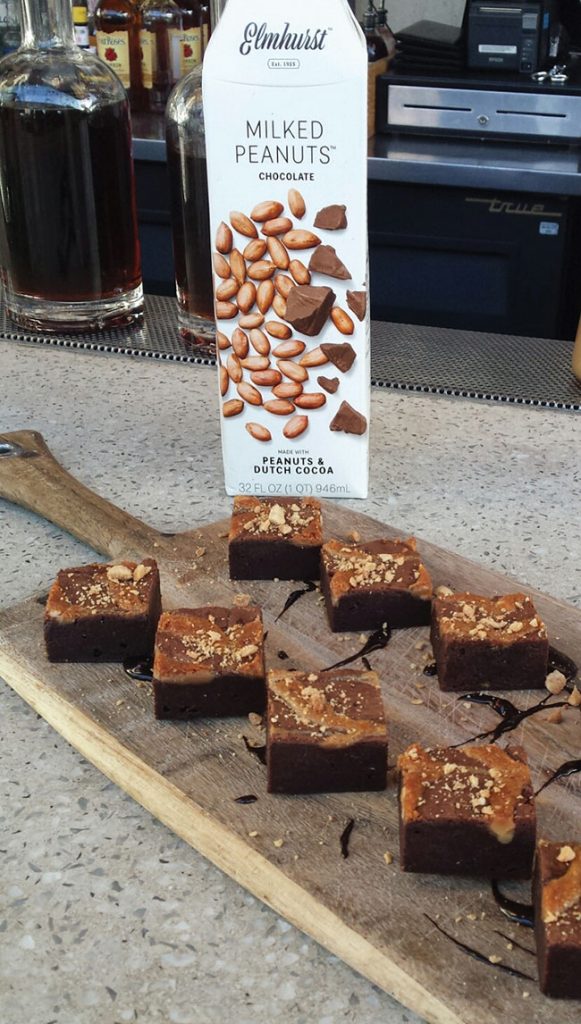
The Final Proof: Plant based baking
April 30, 2018
By
Jane Dummer
Peanut brownies on display at the Winter Fancy Food Show in California.
 Peanut brownies on display at the Winter Fancy Food Show in California. Photo Credit: Jane Dummer
Peanut brownies on display at the Winter Fancy Food Show in California. Photo Credit: Jane DummerThe range of plant-based ingredients continues to grow and nowhere is this more evident than in baking. From vegan cakes to better-for-you plant-based protein cookies, new and exciting products were exhibited at both the Winter Fancy Food Show (WFFS) and Natural Products Expo West in California this year.
Pairing the plant-based trend with protein benefits baking from improved ingredients when it comes to taste, texture and overall appeal for the final product. Key ingredients that caught my attention at both shows included seeds, nuts and pulses (chickpeas, lentil, peas and beans).
Now, with better ingredients and products, the plant-based trend is becoming more mainstream. Jennifer Evancio, Best Cooking Pulses’ director of sales and marketing agrees: “We are seeing vegan and vegetarian food manufacturers requesting egg replacer options in baked goods including cookies, cakes, brownies, muffins and pancakes. We first started looking at pulses as a vegan, clean-label egg replacer when aquafaba hit mainstream awareness. Our interest also coincided with the 2016 United Nations International Year of Pulses.”
Improved versions of egg replacers can be used in applications that traditionally rely upon eggs to provide structure for macarons and meringues. Evancio feels that Angel Food Cake remains the ‘holy grail’ for egg replacement options, and states she’s “seen promising work” that pulse-based egg replacements may provide a solution for food formulators.
When I recall the first few products on the market that had replaced dairy and eggs in baked goods, the mouth feel was not desirable. Luckily, processing and blending techniques for seeds, nuts and pulses have improved over the past decade. I met with Jenny Berrien, Kite Hill’s vice president of marketing, at the WFFS and she explained their process.
“Our nut cheeses are made the same way as dairy milk cheeses. Starting with high quality, non-GMO almonds pressed into milk at our San Francisco Bay Area facility, we add cultures, an enzyme [developed on a vegetable medium] to thicken it, a little salt and let the magic of fermentation run its course. One of our co-founders, Stanford University biochemist Dr. Patrick Brown, systematically tested 27 different nut varietals to determine which ones had the right macronutrient composition with enough fat and protein to form a curd.”
Using time-honoured techniques, Kite Hill has figured out how to make buttery fresh ricotta, aged nut milk delicacies, and cream cheese that all work for the plant-based baking applications. Tal Ronnen, co-founder of Kite Hill and founder and chef of Crossroads Kitchen said: “Cheesecakes have long been made in Italy using ricotta but most American recipes only call for cream cheese. We found that using both Kite Hill ingredients provides a great texture for a plant-based option. Our cream cheese is made from cultured almond milk for a silky smooth texture and subtle tang. Traditional Italian cheesecakes are more ‘curdy’ which the Kite Hill ricotta is ideal for in keeping with traditional, dairy-based ricotta.”
Aside from value-added almond ingredients, new peanut formats have caught my eye. Sherry Coleman Collins, dietitian and consultant to the National Peanut Board explains.
“Peanuts have traditionally been associated with baked goods and desserts. Peanuts benefit from a high but healthy fat composition which lends itself to a desirable thickness and smooth mouth feel when replacing dairy ingredients in baking.”
New to the market is Elmhurst Milked Peanuts. Dr. Cheryl Mitchell, food scientist and innovator at Elmhurst Milked describes the beverage: “In addition to eight grams of protein per 250 ml [8 oz] serving, it’s made with rich Dutch cocoa and whole, raw peanuts to create a creamy texture and delicious flavour that elevates baking recipes.
This peanut milk uses a patented HydroRelease technology, which uses water to liberate nutrients from raw nuts. These nutrients then recombine naturally to form a smooth beverage without the need for industrial chemicals and thickeners. That method allows Elmhurst Milked to retain more nuts per glass, resulting in a healthful, nutrient-rich offering that tastes purely of peanuts and quality chocolate.” I first tasted it baked into a chocolate peanut brownie at WFFS. The brownie was delicious – smooth and silky – definitely a desirable experience.
Jane Dummer, RD, known as the Pod to Plate Food Consultant, collaborates and partners with the food and nutrition industry across North America.
www.janedummer.com.
Print this page

Leave a Reply